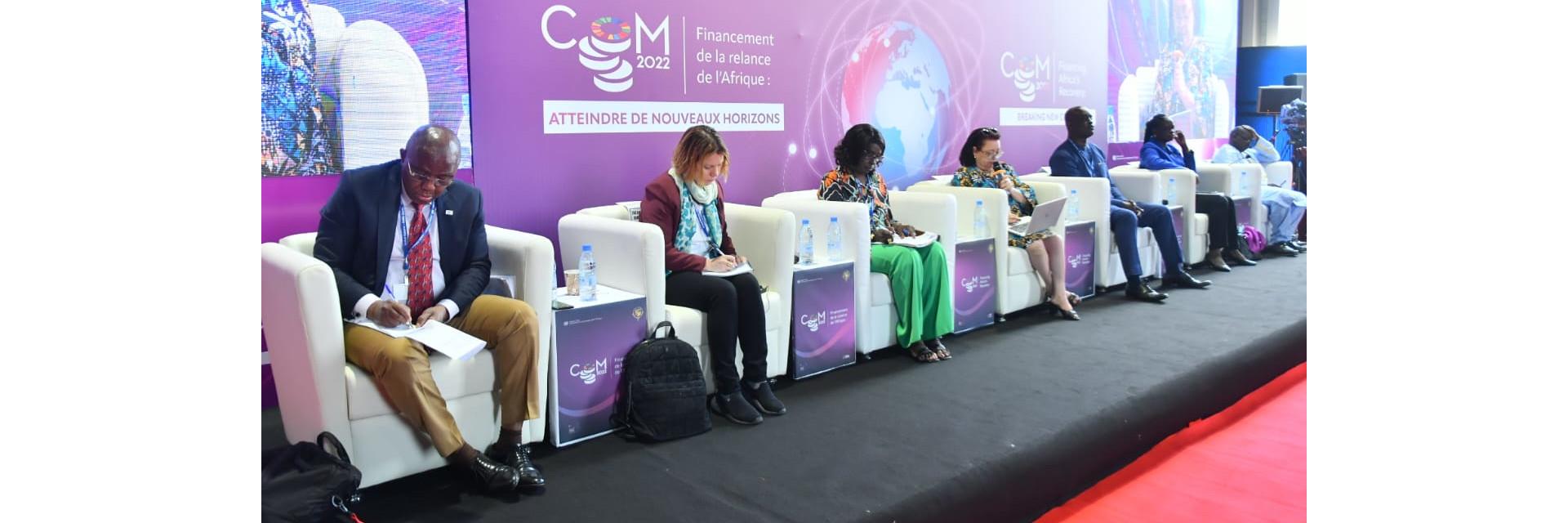Dakar (Senegal), 14 May 2022 – The United Nations Economic Commission for Africa (ECA), through its Sub-regional Offices for North Africa and West Africa and the Institute for Economic and Development Planning (IDEP), in collaboration with the Government of Senegal, discussed on Saturday Innovative financing small and medium-sized enterprises for resilient recovery in Africa: a gender and youth perspective.
This panel session, which was held in the margins of the Fifty-fourth session of the ECA Conference of African Ministers of Finance, Planning and Economic Development, aimed to highlight innovative solutions for resilient recovery and mechanisms for better access to financing while promoting the gender and youth inclusion.
In her introduction, the Director of IDEP, Karima Bounemra Ben Soltane said “As we all know Micro, Small and Medium Enterprises (MSMEs) play a crucial role for economic transformation. They are a vital engine in African economy growth, they are backbone of growth, create employment - especially among youth - and spearhead innovation”.
“Emphasis should be put first on innovative mechanisms to increase the supply of financing to the sector that are appropriate, affordable and accessible throughout the MSMEs business lifecycle, she added.
As for the Director of the Sub regional Office for West Africa of the ECA, Ngone Diop, she made a presentation of the West African business linkages platform launched in September 2021 by her Office and dedicated to women and young entrepreneurs to make the African Continental Free Trade Area a reality and accelerate sustainable development.
“The West Africa Business Linkage Platform will give MSMEs access to a wide range of resources including markets, trainings, jobs, among others”, said Ngone Diop.
The Director of the Sub regional Office for West Africa of the ECA called for deeper understanding of the challenges of SMEs and capacity building for women and youth run SMEs on wealth creation.
In her closing remarks, the Director of the Sub regional Office for North Africa of the ECA, Zuzana Schwidrowski said “In Africa, increasing productive employment of women and youth is a key challenge. Even if women account for more than half of MSMEs , their firms tend to be smaller, less capital intensive and less profitable. Adequate access to finance is key for addressing these issues and establishing high growth potential firms as well as, as COVID-19 experience showed, for their survival”.
“While resources are key for firm productivity, rights, such as the equal right to hold land and other assets, are also critical”, concluded the Director of the Sub regional Office for North Africa of the ECA.
Since MSMEs account for more than 90 percent of employment and tend to employ higher proportions of women and youths than large firms, they are key for integrating these groups into the labor force and society more broadly.
The meeting provided participants with an opportunity to discuss innovative, resilient and inclusive recovery solutions and mechanisms to foster women- and youth-led entrepreneurship, though improved access to finance and a focus on job creation.
Ideas presented at the meeting included earmarking a share of public procurement contracts to youth and female owned SMEs to enable supplier diversity, dedicating one percent of national VAT revenues to finance SMEs, so as to increase their ability to survive and later on contribute to government income through taxes and setting up training programmes to increase small business owners’ financial literacy to improve their ability to secure loans.
Participants also studied policies carried out by the governments of Senegal, Morocco and Tunisia in support to SMEs such as nano credits, trainings, informal sector inclusion in financing territorialization policies, ecosystem buildings, .
The panel presenters included Oulimatta Sarr, Director of the UN Women office for West and Central Africa; Amadou Bao, Director of Strategic Planning, Monitoring and Evaluation at the Delegation for Rapid Entrepreneurship for Women and Youth of Senegal; Thérèse Faye Diouf, Director-General of the Trust Fund for Priority Investments (FONGIP); Moncef Kettani, Member of the Economic, Social and Environmental Council (CESE) and Marwen Amamou, Founder and CEO of Paymee.
Issued by:
Communications Section
Economic Commission for Africa
PO Box 3001
Addis Ababa
Ethiopia
Tel: +251 11 551 5826
E-mail: eca-info@un.org

